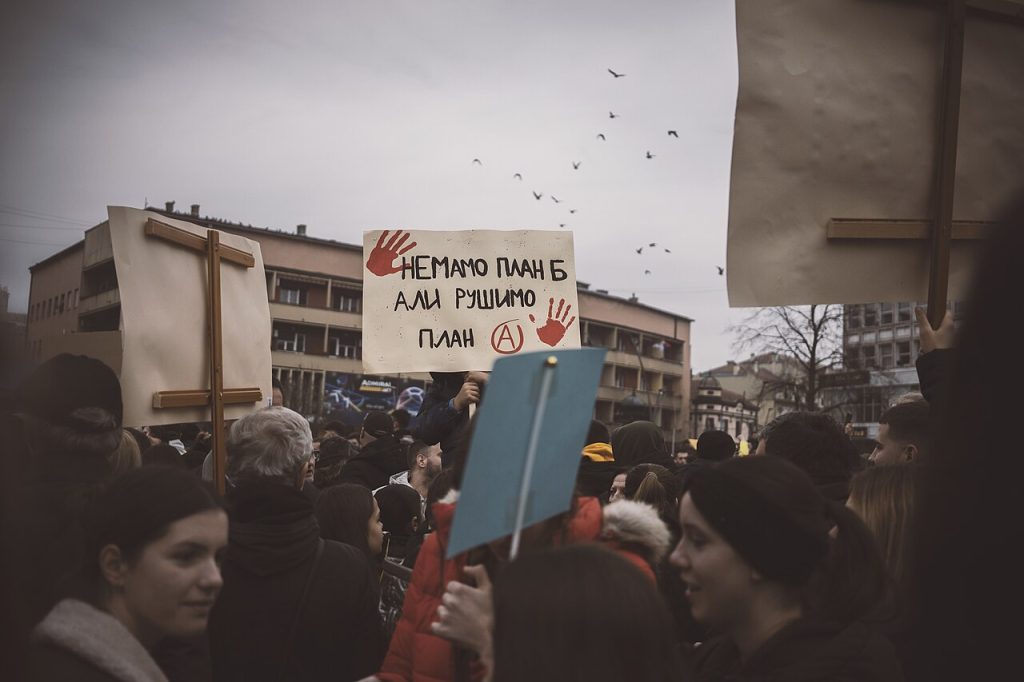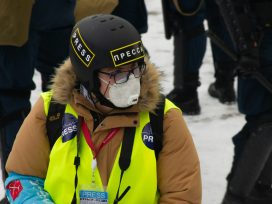Six months after the collapse of a concrete awning at the railway station in Novi Sad, Serbia is in the throes of a general rebellion against the regime of President Aleksandar Vučić. The November tragedy, in which sixteen people lost their lives and two others were maimed, was the final straw and ignited a full-scale uprising. But the causes of the public discontent lie much deeper.
The Serbian Progressive Party (SNS) has been in power since 2012, and in that long period Vučić has built up a system of autocratic rule, gutted the country’s already fragile institutions, and developed a clientelistic network of staggering size. Although Serbia is formally on the path of integration into the European Union (EU), in reality a process is underway that is diametrically opposed to the implementation of European values in Serbian society.
The rule of law, media freedoms and the freedom of speech and opinion are deteriorating year by year, corruption has reached surreal proportions, and Serbia is increasingly coming to resemble Russia or Belarus. The last truly democratic elections were held in 2012, after which they became a farce in which the result is known in advance.
The SNS, with over 700,000 members, has spread its network through all strata of society. Pressure, blackmail and bribery have become standard means of winning votes. Opposition parties and politicians are demonized non-stop in pro-regime media. Vučić has established control over all national television stations, high-circulation daily newspapers, tabloids and widely read web portals, such that he has become, as one poet put it, ‘the master of our mindset’, the one who feeds his image of the world to the majority.

‘We don’t have plan B, but we are destroying plan A’. Protest in Čačak, Serbia, 6 January 2025. Image: Dejan Krsmanovic / Source: Wikimedia Commons
In a partocracy like this, it is impossible to find a decent job or make headway in your career without an SNS party card. Many young people, especially the highly educated, are not prepared to live in subservience, which is why ‘brain drain’ has become massive – every year around 50,000 Serbian citizens move abroad to look for a better livelihood. All research suggests that this number will increase in the immediate future.
According to the report of the Youth Umbrella Organization of Serbia for 2023, almost half the young population (49.2 per cent) intend to leave the country, while 23.6 per cent of respondents are already planning their departure. This is not even the total number of those willing to search for a better life elsewhere: only 11 per cent of young people claim they never want to leave Serbia. All the rest – almost 90 per cent – are potential emigrants.
Serbia has become a country without prospects. That is why until six months ago it seemed quite natural that young people were completely disinterested in politics. Why should they be when they would soon be leaving the country?
But after the Novi Sad disaster, it turned out that young people – especially secondary and tertiary students – were in fact very interested in politics. Not only that: they were ready to actively campaign for democratic change and reform of the rotten system, and to make all the necessary sacrifices in that struggle, from losing a year of studies to experiencing the repression of the SNS regime.
The student movement has become the driving force of civil rebellion, a power that has roused Serbian society from its long torpor. The students have become ‘an unexpected force that suddenly appears and resolves the matter’ – the name of a Belgrade experimental rock group and free translation of deus ex machina.
The rebellion had a domino effect and led people to protest in greater numbers than ever before in Serbian history. According to data of the non-governmental organization CRTA (Centre for Research, Transparency and Accountability), at least 1,697 protests took place in 378 towns throughout Serbia in March alone. The largest protest rally was held on 15 March in Belgrade, where over 300,000 people gathered – more than when the Milošević regime fell on 5 October 2000.
Legality
The intelligent strategy devised by the students contributed greatly to the scale and success of the protests. An autocratic system of rule can be undermined most effectively by ignoring the autocrat and calling for a return to legality. From the beginning, the students’ demands were aimed at the competent state institutions, not at the president himself. They presented four main demands: that the complete documentation on the reconstruction of the Novi Sad railway station be published; that charges against those detained and arrested at protests be dropped; that the persons who physically attacked students and lecturers at blockades be prosecuted under criminal law; and that the funding of public institutions of higher education be increased by 20 per cent.
Sure enough, this strategy has placed Vučić in a corner. The president brags about being a great chess player, but there was no good move he could have made in this situation. Everything he did was wrong for the simple reason that he does not have the competence, by law, to resolve the problems the students pointed out. It is not the president, but the public prosecutor, the police, the ministries and the various other bodies of the captive state that should have acted.
But they did not, and could not, because none of them know what they should be doing any more. They are used to behaving like marionettes on a string pulled by the master puppeteer. But it cannot be said that the president and his SNS clique had a hard time taking the institutions captive. Rather, the institutional representatives could hardly wait to free themselves from professionalism, conscience and personal responsibility, and to become the voluntary slaves of a freakish regime.
The strategy applied by the students has revealed with painful clarity the dead-end into which Serbian society has been manoeuvred. Vučić is used to deciding everything by himself, to being the only one who negotiates with disgruntled citizens, to being the sole mover-and-shaker in all social and political processes. The students have simply ignored this habit, just as they have ignored the president himself. And they have the best possible basis for this – the laws and constitution of Serbia. The country has well-drafted laws. Everything would be fine if only the competent authorities worked in accordance with them.
But everything is upside down: virtually no one obeys the law, and almost everyone works to the orders of one man whose minions have allowed him to usurp power. This does not mean that the constitution and the laws have been suspended. On the contrary, they are still valid, and there are no others. The young population is simply demanding a return to the rule of law and an orderly system. But what sounds like the most normal thing in the world is an impossible mission in a state of lawlessness and arbitrary rule by one man.
Vučić and his camarilla have not understood what has been happening for the last six months because compliance with the law is not on their agenda. The president has tried to silence the student revolt in every possible way: by bribing with affordable apartments and surreally cheap loans; making threats; sending party thugs to blockades; publicly issuing permission for SNS drivers to run down protesters; repeating the old story about foreign agents and ‘coloured revolutions’; launching smear campaigns against the students; carrying out arrests; withholding lecturer’s salaries; ostensibly satisfying demands; making political sacrifics (prime minister Miloš Vučević); allowing the government to fall…
Nothing worked. The only thing Vučić could have done was to let the institutions do their work without his interference. But that is completely unimaginable, impossible and unreal for him – more fantastic than any tale of imagination.
Liberation
Declaring the president of Serbia to be ‘not a competent institution’ has undermined the incontestable authority that Vučić once imposed. His almost daily appearances on national television no longer have the same hypnotic effect, and the support he enjoyed is drastically declining. According to public opinion polls from February, about 80 per cent of Serbian citizens support the students’ demands, and a third of the population states that they participated in the protests. The largest increase in support was recorded among those who normally back the parties in power. The atmosphere in society has changed – the protests have freed people from fear, and optimism has finally appeared for the future of the country.
This change came about thanks to the commitment of the students who crisscrossed the country on foot to meet ordinary people, explaining to them in the cities, towns and villages what their demands are and what kind of society they wish to build. A constitutional order, institutions that do their job, and laws that are upheld – these are the thing the students want. There were moving scenes during the students’ trips around the country: they were welcomed everywhere with food and drink; people greeted them, bowed to them, hugged them and cried; the years of pent-up discontent, frustration and despair turned into tears of relief and hope.
It feels as if society is undergoing mass psychotherapy, a catharsis brought about by Serbia’s rebellious youth. The reception given to the students across the country resembled the one given to the liberators of Yugoslavia in 1944. People do not conceal that they view the students as saviours.
Politicization
The fairground atmosphere and lack of political articulation raised concerns that things would end without a satisfactory outcome. The students insisted they were apolitical and distanced themselves from opposition parties and NGOs, instead of creating a united front with all opponents of the regime. Months passed and none of their demands were met. Nor was there any expectation they would be, since compromise is foreign to the SNS regime and violence and repression the only means it knows.
In April, the students added two more demands. The first was that the device that many claim to have been a banned ‘sonic cannon’ employed against demonstrators on the 15 March in Belgrade be identified, along with the person who ordered its use. The second demand was that responsibility be established for the visit by Vučić and teams of journalists to victims of the fire in Kočani, North Macedonia, who were undergoing treatment in an intensive care ward in Belgrade, although such visits are strictly prohibited because they can endanger the lives of patients. Of course, the new demands met with the same response as the previous ones – the regime had no intention of satisfying them.
Finally, at the beginning of May, the students put forward a political demand. This has significantly changed the nature of the protests. They called for the immediate dissolution of the National Assembly and for extraordinary parliamentary elections in accordance with article 109 of the Serbian Constitution. They announced that they would select candidates for the ticket by mid-May. According to their criteria, members of parties in the ruling coalition and current functionaries of opposition parties are not eligible. They appealed to people to support ‘the ticket that the students blockading all higher-education institutions in Serbia will put their trust in, so that truth will prevail on the scales of justice’. Most of the opposition parties endorsed the demand and promised to support the students’ ticket.
It is usually parties that are the vehicle of political processes, but many things in Serbia are topsy-turvy, including the status of the opposition. Although years of demonization in the media have made it unpopular, it largely has itself to blame. Inactivity, lack of ideas, and disorganization have given the opposition a poor reputation, while its ill-considered boycott of local elections has led to the SNS gaining power in every municipality in Serbia except Medijana in the city of Niš.
The students have thus practically been forced to assume a political role. The enormous trust placed in them by broad sections of the population also obliges them. Although it is not a political organization, the student movement is the only force that has substantial political credibility. The opposition could hardly be expected to improve its standing and gain popular trust overnight, when it had failed to do so during all the years of SNS rule. From the beginning of the protests, it was clear that exceptional circumstances demanded creative solutions, outside of the usual framework.
Vučić told the students that he would not wait long for the elections, although other functionaries of his party have sent different messages. The president of the SNS, Miloš Vučević, said elections would ‘lead to disaster for the country’. It is not clear what kind of apocalypse awaits in case of extraordinary elections – this is clearly panic-mongering, because the SNS know that support for the party is melting like a snowman in the spring sun. Vučić has called early elections countless times, without any reason, and now, when there are real reasons for extraordinary elections, the SNS is suddenly abandoning its favourite political tool.
At the same time, elections favour the regime, since none of the recommendations of the OSCE Office for Democratic Institutions and Human Rights have been implemented: a revision of the electoral register and the redress of problems such as voter bribery, forged signatures, fake lists and absence of media pluralism – all have been ignored.
Russia
One of the many ways in which the regime has attempted to discredit the student movement has been by rehashing of the old story about the conspiracy of western powers against freedom-loving Serbia. Vučić even announced he would be publishing a book entitled How I Defeated the Coloured Revolution, which he was sure would become an international bestseller. Russian propaganda, which has exerted a strong influence on Serbian society for at least a decade and a half, is on the same wavelength. Vučić thanked the Russian foreign minister, Sergei Lavrov, for ‘condemning the attempt at coloured revolution in Serbia’ and added: ‘Russia knows what that looks like.’
During a meeting with the Serbian foreign minister, Marko Đurić, in Moscow on 17 February, Lavrov said that Russia condemns the interference of other, primarily western countries in the internal political processes of Serbia. The former Serbian minister of the interior, Putin fan Aleksandar Vulin, also travelled to Moscow to meet Lavrov. The two officials used the occasion to express their common concern about ‘attempts at coloured revolution and the destabilization of Serbia by western intelligence agencies’.
Vulin’s trip and the terse post-meeting communiqué were in late February. Just one month later, Vulin, who was awarded a medal for cooperation with the Russian FSB in 2024, gave a detailed statement to RIA Novosti explaining Russia’s role in the turbulent events of recent months in Serbia. The Serbian authorities, he said, were grateful to the FSB for information that had helped counter the coloured revolution. Adding that the Russian services ‘know what danger threatens Serbia’, Vulin affirmed that a previous agreement between the security services of the two countries to cooperate in the struggle against coloured revolutions ‘remains in force’. This was a reference to an agreement made in December 2021, when Vulin and Nikolai Patrushev, then secretary of the Security Council of the Russian Federation, met in Moscow.
Russia, in other words, is behaving true to form, supporting the friendly Vučić regime and trying to prevent any possibility of Serbia moving closer to the EU and freeing itself from the malign influence of the Kremlin.
Europe
This makes the attitude of the EU towards the student movement, and vice versa, all the more inexplicable. Until only recently, the relationship can be best described as mutual refusal to acknowledge the other. For the most part, EU officials have reacted to the protests with reserve, while the students have not carried EU flags or appealed to its institutions.
In truth, many who wish to see democratization are irritated by the attitude of EU functionaries towards Vučić and his regime. Avowals that Serbia is making progress on its path towards EU membership, the pretence that the Serbian authorities are implementing reforms, and other bureaucratic rhetoric detached from reality, are all discouraging for democratically oriented people. Praise for Vučić personally from the President of the European Commission, Ursula von der Leyen, was particularly galling.
A large section of the public perceives the EU as Vučić’s ally – a hypocritical organization that cares more about stability than democracy in Serbia. The only the members of the European Parliament who sharply criticize Vučić belong to the Socialists, Democrats and Greens. The parliament’s rapporteur for Serbia, Tonino Picula, whose reports describe the real state of affairs, is another ray of light in an otherwise gloomy picture.
The students, for their part, have shown little euro-enthusiasm. And yet their demands and ideas for political change are fully compatible with the EU: specifically, chapters 23 and 24 of the accession negotiations with the EU, which combine all the provisions concerning the judiciary, human rights and freedoms, justice and security. The peculiar symbols and absurdly misplaced insignia often seen at the protests, for instance ‘Wagner’ flags, do not contribute to Europe’s understanding of the current situation.
After several months of protests, however, the students have realized that they should turn to the EU and its institutions. And so a group of eighty students rode on bicycles to Strasbourg to present their demands to the European Parliament and explain what they are fighting for. This was followed by a relay marathon run to Brussels with a similar goal, with students attending the session of the EP where Picula’s report was tabled and adopted with an overwhelming majority.
The statement of Marta Kos, the European Commissioner for Neighbourhood and Enlargement, that the students’ demands were the same as what Brussels is seeking from the authorities in Belgrade in the accession talks, was also encouraging. This ought to have been clear from the outset, yet neither the EU officials nor the students had expressed it before.
Finally, on Victory Day, things fell into place: while Vučić joined other autocrats at a cynical celebration in Moscow overseen by Vladimir Putin, who makes a travesty of the struggle against fascism and shows the middle finger to the EU, the students were on their way to Brussels.
After half a year, the student movement is finally on track to topple the authoritarian Vučić regime and lead the people of Serbia out of voluntary subservience. If this outcome comes to pass, which it may well do, the recipe could be extended to other countries with comparable problems: Bulgaria, North Macedonia, who knows where else?
A similar chain of events occurred after the ousting of the Milošević regime in 2000, when the activism and methods of the political organization Otpor (Resistance) became an inspiration to people around the world who used nonviolent means to struggle against dictatorship. Freedom can be contagious.







